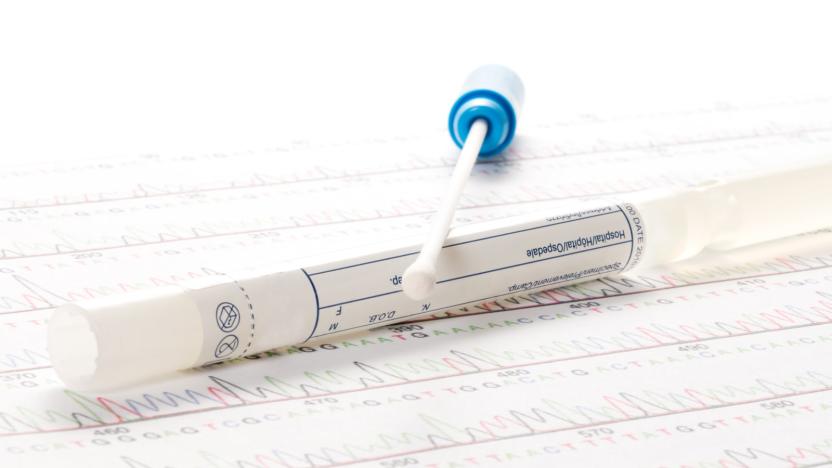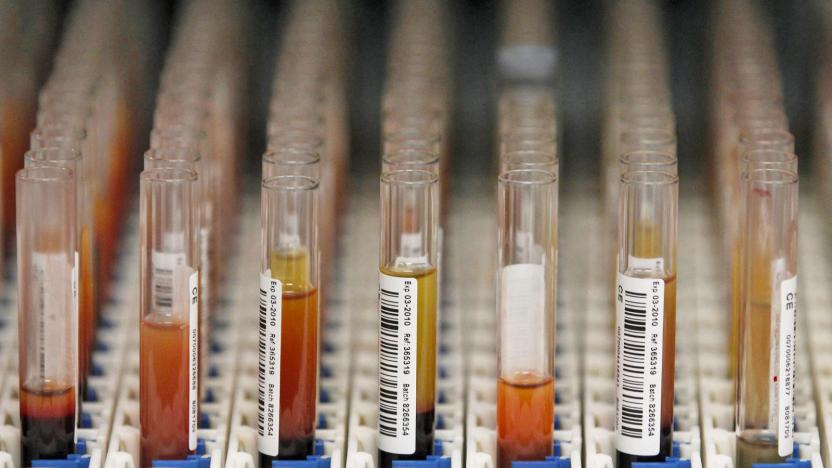dnatesting
Latest

At-home DNA testing company gives the FBI access to its database
The FBI has struck up a partnership with one of the largest at-home DNA testing services, according to BuzzFeed News. Apparently, Family Tree DNA has allowed the agency to access its genealogy database containing the DNA profiles of over a million users. Law enforcement has been using the public's increasing fascination with DNA testing as a tool to crack cases for quite a while now. But this is reportedly the first time a private firm has willingly given authorities access to its repository.

California Rep. requests 23andMe to help reunite children with families
California Representative Jackie Speier reportedly asked DNA-testing company 23andMe to help reunite children separated from their parents at the US-Mexico border due to Trump's 'zero tolerance' immigration policies. She told Buzzfeed that she was concerned with the lack of records for families that have been split up, but it was unclear if, or to what extent, the genetics company would get involved.

DNA is just another way we can’t opt out of data sharing
Growing up in California, serial killers are as much a fact of life as year-round citrus or having a bit of Spanish in your daily vocabulary. News of the Golden State Killer's arrest came as a surprise and a relief to most of us whose early lives were shaped by a generation of fear. The Golden State Killer raped at least 51 women and killed 12 people (that we know of). Our parents literally slept with guns and knives under the killer's shadow, and the many others like him.

The FDA just changed how it reviews genetic health risk tests
FDA Commissioner Scott Gottlieb announced new rules today regarding direct-to-consumer genetic health risk (GHR) tests and the process by which they're approved for sale. In a statement, Gottlieb explained that these sorts of tests can provide more and more information as the technology develops, information that is not only in demand but could also serve as a useful medical tool. "These tests can prompt consumers to be more engaged in pursuing the benefits of healthy lifestyle choices and more aware of their health risks," said Gottlieb. "Consumers are increasingly embracing genetic health risk testing to better understand their individual risk for developing diseases."

FDA clears 23andMe to warn you about potential health risks
Good news for everyone who wants to do at-home DNA tests: 23andMe has been cleared by the Food and Drug Administration to tell customers if they're at risk for 10 potentially debilitating diseases. "These are the first direct-to-consumer tests authorized by the FDA that provide information on an individual's genetic predisposition to certain medical diseases or conditions, which may help to make decisions about lifestyle choices or to inform discussions with a health care professional," the watchdog agency said in a statement. Previously, the FDA had stopped the company from offering this information back in 2013. The FDA softened its stance a bit in 2015.

UK scientists get permission to 'gene edit' human embryos
A team of British scientists has been approved to use "gene editing" techniques on human embryos, in the hope that it will better our understanding of early human life. A group at the Francis Crick Institute in London wants to research newly fertilised eggs and how they develop in the first seven days -- from a single cell to a blastocyst with roughly 250 cells. Using gene manipulation, the researchers want to glean new insights about our DNA and the exact requirements for a healthy embryo. With this information, specialists could find ways to improve post-IVF embryo development techniques and clinical treatments for infertility.

23andMe plans to use your genetic data to create new drugs
For over a year now, 23andMe has been stuck in a regulatory quagmire with the US Food and Drug Administration (FDA). Although it's still able to sell its personal DNA kits, the company is effectively banned from offering health-related genetic tests in the US. A few weeks ago it was given the go-ahead for a single check, a rare disorder called Bloom syndrome, but it's only a small step towards the broader health reports it provided before. While it waits for wider FDA approval, 23andMe has decided to enter the drugs market. The company already works with major pharmaceutical firms including Pfizer and Genentech, but now it's prepared to go it alone. The startup has accrued a vast amount of health-related information from its users, so there's an obvious opportunity to apply that database to the field of medicine. Instead of just looking for health-related ailments, and offering users the results, 23andMe wants to go one step further and develop the cures too.

23andMe gets FDA approval, but only to test rare Bloom syndrome
For over a year now, 23andMe has been effectively banned from offering its US customers health-related genetic tests. The company is still selling its personal DNA kits, but the information it can provide is limited to ancestry-related reports and raw genetic data. The US Food and Drug Administration (FDA) was behind the original clampdown in 2013, but this week it's given the company its blessing for a new test. With the fresh approval, 23andMe can now offer to look for signs of Bloom syndrome, a rare disorder which is characterized by short stature, sun-sensitive skin and increased cancer risk. While this is a specific test, rather than the broader health reports it offered before, 23andMe calls it an "important first step" to offering detailed genetic advice in the US once more.

NEC shows 2014-era portable DNA analyzer that could outpace your favorite crime drama
NEC gave us promises of truly on-the-spot forensics when it unveiled its first portable DNA analyzer back in 2007, although the reality hasn't been quite in line with the dream: its current system takes an hour to get a result and won't win any awards for sleekness. From what we're seeing of a next-generation analyzer due in 2014, those expectations are more likely to be met. The new version puts the full DNA extraction, amplification and separation processes on a newer chip that meets NEC's original goal of producing output in 25 minutes -- faster than a short cop drama, if you include the commercial breaks. Few beyond the police will be casually tossing the analyzer around given its 70.5-pound weight and $120,000 price, but a much slicker design at least gives it the profile of a small, rolling suitcase. The upgrade could be vital for identifying suspects and victims in record time; if our only worry is that NEC takes all the mystery out of our favorite TV shows, we'll be more than satisfied.

Oxford makes big push into Bigfoot research, enlists Swiss zoologists for DNA study
The search for Bigfoot continues and, no, that's not a nod to a very special episode of Unsolved Mysteries. Though Harry and the Hendersons did its best to humanize that monster of myth, a group of well-heeled European scientists are seeking to go beyond the Hollyweird fantasy to actually prove the creature's existence using advanced genetic techniques on Yeti remains. Part of a collaborative effort between Oxford University and the Lausanne Museum of Zoology, the Collateral Hominid project aims to gather material from public and private cryptozoological collections for analysis to determine whether that elusive species branched off from bears or our neanderthal forebears. Project head Prof. Bryan Sykes hopes the research, the results of which will eventually make the rounds of peer-reviewed journals, will dispel skepticism that has surrounded this controversial creature by providing " a mechanism for... identification that is unbiased, unambiguous and impervious to falsification." Basically, these real-life Mulder & Scullys want incontrovertible DNA proof that these fantastic ape-like beings are simply the stuff of evolution. Whatever the case, the truth is most certainly out there, folks -- it's just likely encased in fossilized dung. [Image courtesy Worch.com]

Time names the 23andMe retail DNA test 'Invention of the Year'
Time Magazine has released its annual Best Inventions issue, and topping the list is the 23andMe retail DNA test, a kit which which offers consumers 23 clinical reports on their genetic risk for everything from Psoriasis to Prostate Cancer. It may not be as well known as last year's iPhone (or YouTube the year before that), but the $399 package might signal a significant revolution in preventative medicine... or it might bring mankind a disturbing new form of eugenics. Whatever you use it for, the process couldn't be easier: the kit comes with a tube that you spit in and mail back to the company, which in a mere 4 - 6 weeks will notify you that testing is complete. As you wait for the results to be posted online you might want to spend some time contemplating the ethical dilemmas posed by this technology.







